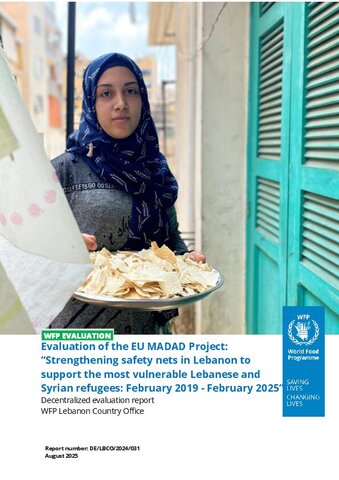
The EU MADAD project aimed to increase the economic resilience of vulnerable populations by providing Multi-Purpose Cash (MPC) assistance to Syrian refugees and to Lebanese citizens through the National Poverty Targeting Programme (NPTP). A second key objective was to strengthen the institutional capacity of the Ministry of Social Affairs (MoSA) through technical assistance (TA). The project was implemented across all eight governorates in Lebanon, during a period of unprecedented crisis.
The evaluation provided an independent assessment of the MADAD project against the OECD DAC criteria of relevance, effectiveness, efficiency, coherence, impact, and sustainability. The findings will be used to inform operational and strategic decision-making for WFP and the EU. The evaluation had both accountability and learning objectives with equal priority given to both objectives.
The evaluation identified thirty-three findings and twelve conclusions, leading to the following five (summarized) recommendations:
1 (Operations): WFP Lebanon should continue prioritizing unconditional and unrestricted cash transfers aligned with the SMEB gap, importantly, linking this assistance to complementary services (e.g., livelihoods, vocational training) where feasible.
2 (GEDSI): continue collaboration with specialised agencies to provide gender-related, protection and disability inclusion training and capacity strengthening to project partners.
3 (Targeting): While using effective, multi-model targeting, WFP must invest significantly in a simplified and transparent communication strategy, proactively explaining the "why" and "how" of beneficiary selection to build community trust.
4 (TA): WFP globally should consider developing tailored guidance on strengthening social safety nets. TA processes should start with a consultation to identify governance gaps and a joint plan of action with authorities.
5 (Capacity strengthening): WFP should engage with the Lebanon Government to strengthen the connection between MoSA at central and field levels, particularly in relation to GRM services, M&E activities, and standardizing updates.
